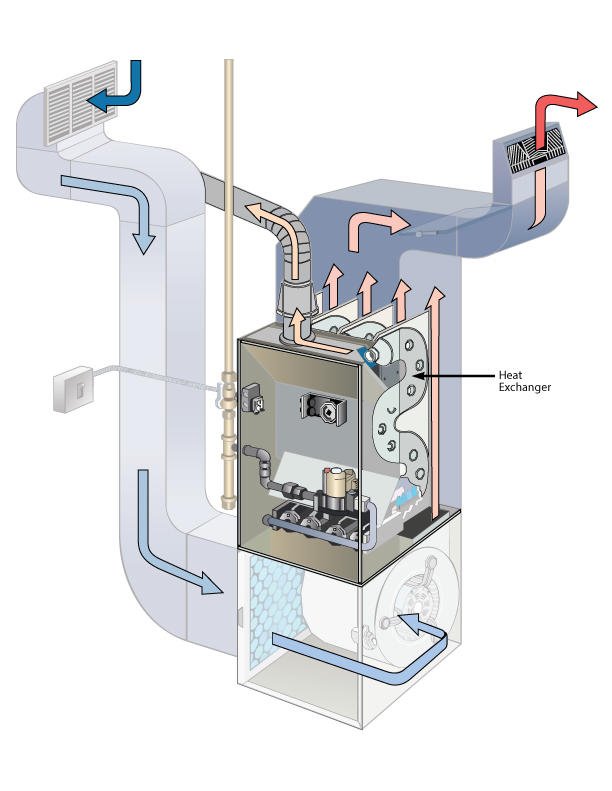Understanding Furnace Heat Exchangers and Their Replacement Costs

A furnace heat exchanger is a crucial component that plays a key role in heating your home safely and efficiently. However, when it fails, the repair or replacement costs can be substantial—sometimes approaching the price of a new furnace, which might range up to $5,000.
If you're facing issues with your heat exchanger and are unsure of the next steps, this article is for you. We’ll cover:
- What does a furnace heat exchanger do?
- Signs of a broken furnace heat exchanger
- The cost to replace a furnace heat exchanger
- Whether to repair vs. replace your furnace
Deciding whether to repair or replace a component as critical as the heat exchanger can be daunting. In some cases, repair might be sufficient, but under certain circumstances, installing a new furnace could be the most economical choice. Let’s dive deeper into how to identify and handle issues with your furnace’s heat exchanger.
Contact Thornton & Grooms for fast furnace repairs today
With our flat-rate, upfront pricing, it's easy to know when to repair your furnace or replace it. Fast and convenient appointment scheduling means we'll give you an estimate within 24 hours and can typically have your furnace fixed the same day.
What Does a Furnace Heat Exchanger Do?
The heat exchanger is the part of the furnace that warms up the air that is eventually distributed throughout your home. So, what exactly is the heat exchanger in a furnace? It is a system of metal coils that absorbs heat from the combustion chamber and transfers that heat to the air that runs through the coils.
The combustion chamber is where the fuel that supports your furnace is burned to create heat. The burners heat the coils of the heat exchanger. When new, cooler air passes over the coils, it warms up, and the air re-circulates into your home. The coils use indirect heat to warm the air so your home is protected from harmful gases such as carbon monoxide (CO) and other combustion by-products. With this setup, the ash and soot stay in the furnace and the chimney, leaving you with clean, warm air for your home.
Signs of a Broken Furnace Heat Exchanger
Since a furnace heat exchanger is crucial for reliable heat, you should watch out for signs that it's wearing out. Some of the most common issues include:
- Cracks or corrosion. Any cracks or rust on the metal coils can indicate wear. Physical defects can give gases a place to escape through into your home, making them dangerous to your health and safety.
- Soot buildup. Look for soot residue left inside the furnace. Any soot that remains can indicate that the heat exchanger isn't working properly, leading to incomplete combustion.
- New or worsening odors. If you notice the smell of mothballs or a metallic odor, it could indicate gasses mixing with the air inside your home, even if you can't see any cracks.
- Carbon monoxide alerts. Carbon monoxide detectors are an important safety feature for homes with a combustion furnace. If yours starts to go off more frequently, it could mean there's a problem with your heat exchanger.
The Cost to Replace a Furnace Heat Exchanger
The cost of replacing a furnace heat exchanger can vary dramatically based on make, model, age, fuel, and size. While furnace heat exchangers average $1,750 to repair or replace, the cost can go upwards of $5,000. One of the most significant factors that impact your out-of-pocket costs is whether the system and/or part is still under warranty. The heat exchanger part can cost $850 with no other costs included. If the unit is still under warranty, the manufacturer covers that expense, and you only pay for the labor involved in the repair.
If your unit was recently installed, there may even be a warranty on the installation. We always offer a 1-year parts and labor warranty on new installations.
Whether to Repair vs. Replace Your Furnace
The average cost of a new furnace typically rounds up to about $7,500, often more than a repair job for a component like the heat exchanger. However, the most cost-effective option can depend on several factors:
- Age of Your Furnace: If your furnace is near or beyond its typical lifespan—usually around 15 to 20 years—it might be wiser to invest in a new system rather than pay for repairs on a unit nearing the end of its efficiency.
- Condition and Maintenance: A well-maintained, relatively new furnace with a faulty part still under the manufacturer’s warranty (which generally covers 10 to 20 years) should probably be repaired. This is especially true if the rest of the unit is in good condition.
- Cost of Repairs vs. Replacement: Evaluate the cost of repairs against the cost of a new furnace. If repairs are frequent or expensive, replacing might save more money in the long run.
Deciding between repair and replacement involves assessing both the immediate costs and the long-term benefits. If your furnace is very old, continual repairs may simply delay the inevitable need for a replacement, often making it more economical to upgrade to a newer, more efficient model sooner rather than later.
Get Fast, Reliable Furnace Repairs from Thornton & Grooms Today
Our friendly, respectful, and professional technicians at Thornton & Grooms will handle your furnace repairs within 24 hours. With our 85+ years of service, we've built a five-star reputation and always complete calls with 100% satisfaction guaranteed.
- Tagged:
- Buyer's Guides
